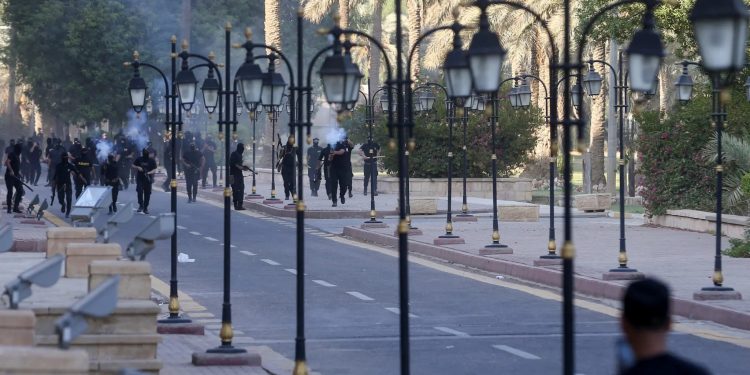IRAQ – Iraq sank deeper into political chaos on Monday after the influential Shiite cleric Muqtada al-Sadr announced he was retiring from politics and at least 12 of his supporters were shot and killed by government security forces while protesting in the capital, Baghdad.
Mr. Sadr’s pronouncement on Twitter sent hundreds of his followers into the streets of Baghdad, where they breached concrete barriers guarding the so-called Green Zone, the site of Parliament, Iraqi government offices and diplomatic missions, including the U.S. Embassy.
At least 12 protesters were killed and more than 100 were injured when security forces fired on them, according to two Iraqi officials who asked not to be identified because of the sensitivity of the issue. Baghdad and most provinces were under curfew by Monday evening. The Associated Press later reported that at least 15 protesters had been killed by gunfire, citing a senior medical official.
A senior aide to Mr. Sadr, Hassan al-Adhari, said late on Monday that the Shiite cleric was declaring that he would go on a hunger strike until “the violence and use of weapons stops.” Although political turmoil and street protests are common in Iraq, Monday’s developments — with a combustible mix of inter-Shiite divisions and the breaching of state institutions, along with political deadlock — could mark an even more dangerous phase.
Iraq has been without a new government since elections last October, when candidates loyal to Mr. Sadr won the single biggest bloc of seats and eclipsed rival Shiite political parties backed by Iran. That has left the country with a caretaker government that has not been able to address urgent economic problems, such as passing an annual budget, among other priorities.
Mr. Sadr, whose militia fought U.S. troops during the American occupation of Iraq, comes from a family of revered clerics and is Iraq’s most influential Shiite religious figure involved in politics. In the midst of disagreements with other parties over who should be president and prime minister, he threw the process of forming a government into turmoil in June when he ordered newly elected members of Parliament loyal to him to resign.
Some international organizations were conducting evacuation flights from the Green Zone by helicopter to Baghdad’s international airport.
Stéphane Dujarric, a spokesman for the secretary general of the United Nations, António Guterres, said that he was alarmed by the developments.
Security forces closed roads south of the capital, preventing more protesters from arriving from southern provinces that are Sadr strongholds. One of those provinces, Dhi Qar, announced all government offices would be closed Tuesday because of security concerns.
Iraqi security forces include members of Iran-backed paramilitaries not directly under the control of the government. Prime Minister Mustafa al-Kadhimi said the use of live fire by security forces was banned and he was launching an investigation into the shootings.
Security forces also used tear gas and water cannons against protesters in the Green Zone. As the night folded armed clashes broke out and the number of dead is uncertain.
Neighboring Iran announced it was closing all land borders with Iraq until further notice and warned citizens not to travel to Iraq, saying the country was working to return Iranian visitors home safely. Tehran’s international airport suspended flights to Baghdad. Millions of Iranian pilgrims travel to Iraq every year to visit historic shrines at the heart of Shiite Muslim identity.






